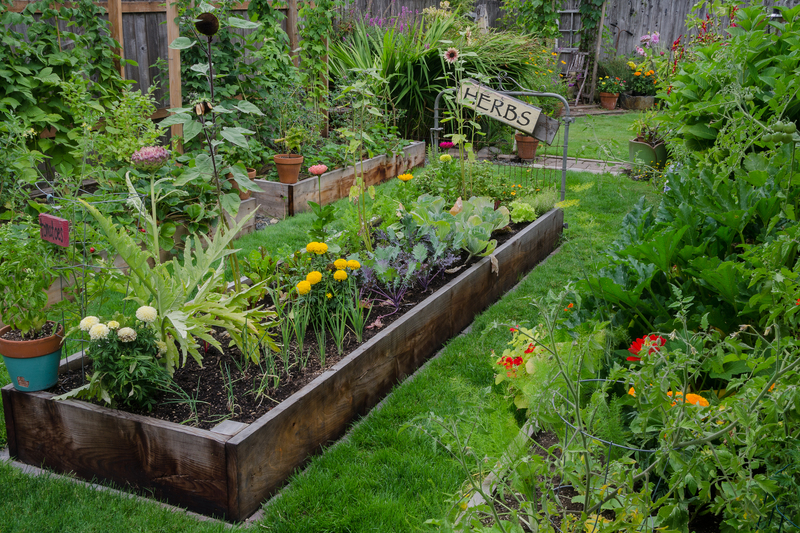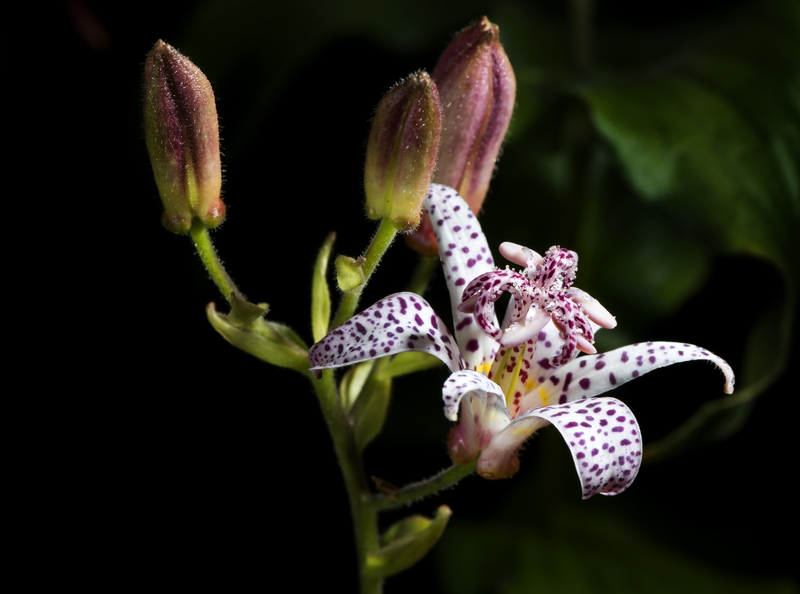Start your gardening adventure with these 9 key tips
Posted on 02/07/2025
Start Your Gardening Adventure with These 9 Key Tips
Are you ready to begin your gardening journey? Whether you have a balcony, a backyard, or just some sunny windowsills, gardening is a rewarding activity that brings you closer to nature and adds beauty to your everyday life. Starting a garden can seem daunting at first, but with the right knowledge and a little patience, anyone can create a thriving green space. In this guide, we'll share 9 essential tips to help you kick off your gardening adventure with confidence, joy, and a sense of accomplishment.
Why Start Gardening?
Gardening goes beyond planting seeds and watering them. It offers a relaxing escape from daily stress, a way to connect with nature, and an opportunity to grow your own food or flowers. Beginning your gardening adventure can also improve your mental and physical health, encourage sustainability, and even save money in the long run. Whether your goal is a lush vegetable patch or a colorful flowerbed, every successful garden starts with a bit of preparation and know-how.

1. Know Your Gardening Space
Evaluate Sunlight and Shade
The first step in starting your gardening adventure is to understand your space. Observe how the sunlight moves across your garden throughout the day. Most plants require a minimum of 6 hours of sunlight, but some thrive in partial shade.
- Full Sun: 6+ hours of direct sunlight
- Partial Sun/Shade: 3-6 hours
- Full Shade: Less than 3 hours
Take note of these patterns to select the right spot for your garden and to choose suitable plants.
Consider the Soil Quality
Healthy plants start with healthy soil. Test your soil for texture and nutrients. A quick DIY method: squeeze a damp handful--if it crumbles, it's sandy; if sticky, it's clay. Ideally, you want a slightly crumbly, dark loam. If your soil is lacking, amend it with organic compost or quality topsoil.
2. Choose the Right Plants for Beginners
One key step in a beginner gardener's adventure is selecting the right varieties. Some plants are more forgiving and easier to grow, making them perfect for first-timers.
- Leafy Greens: Lettuce, spinach, and kale grow quickly and tolerate a range of conditions.
- Herbs: Basil, parsley, chives, and mint are simple to care for and handy in the kitchen.
- Marigolds and Sunflowers: These flowers not only look beautiful but also attract pollinators.
If you're unsure, visit a local nursery and ask for recommendations that fit your local climate and sunlight conditions.
3. Plan and Design Your Garden Layout
Sketch or map out how you want your garden to look. Decide whether you'll use containers, raised beds, or an in-ground plot. Planning early helps you organize your space efficiently and prevents overcrowding of your plants, which could stunt their growth.
- Leave enough space between plants for them to mature.
- Group plants with similar needs together.
- Consider mixing flowers and veggies for a beautiful and functional garden.
Container Gardening for Small Spaces
If you don't have a lot of room, containers can be your best friend. Start your gardening journey on balconies, patios, or windowsills using pots of various sizes. Just make sure they have good drainage and use a high-quality potting mix.
4. Invest in Basic Gardening Tools
You don't need fancy equipment to start your gardening adventure. A few well-chosen, durable tools will make planting and maintenance much easier:
- Hand trowel for digging and transplanting
- Watering can or hose with adjustable nozzle
- Pruning shears for trimming plants
- Gloves for protecting your hands
- Garden fork to aerate and mix soil
Invest in tools that feel comfortable in your hands and are suited to the jobs you'll perform most frequently.
5. Learn the Best Watering Practices
One of the most common mistakes for new gardeners is incorrect watering. Most plants prefer deep, infrequent watering to shallow, daily sprinkles. Watering early in the morning or late in the afternoon reduces evaporation and helps prevent fungal diseases.
- Check soil moisture regularly with your finger--if it's dry 1-2 inches down, it's time to water.
- Use mulch around plants to retain moisture and reduce weeds.
Tip: Overwatering is just as harmful as underwatering. Learn your plants' specific needs for a healthy garden adventure!
6. Feed Your Plants Regularly
Your plants need more than water and sunlight--they also require nutrients. Use organic fertilizers or compost to provide balanced feeding. Beginner gardeners can start with slow-release fertilizers, which are simple to apply and minimize the risk of overfeeding.
- Compost improves soil texture and infuses it with essential nutrients.
- Fish emulsion and seaweed extract are excellent natural fertilizers.
Feed your garden according to the instructions for each particular plant, as too much fertilizer can do harm.
7. Monitor for Pests and Diseases
Keep an eye on your plants for early signs of trouble. Spotting pests or diseases quickly allows you to act before serious damage occurs. Common issues for beginners include aphids, slugs, powdery mildew, and leaf spot diseases.
- Handpick pests or use a jet of water to dislodge them.
- Try natural remedies like neem oil or insecticidal soap.
- Always maintain cleanliness in your gardening space by removing dead leaves.
Healthy, well-fed plants are less vulnerable to pests, so regular care is essential.
8. Be Patient and Keep Learning
Gardening is a process, not a race. It can take weeks or months to see the fruits of your labor (sometimes literally!). Don't be discouraged by a few setbacks--every beginner gardener makes mistakes. Celebrate your successes and learn from challenges. Join local gardening groups, attend workshops, and read reliable resources or gardening blogs to expand your knowledge.
Enjoy the Journey
Remember, the goal isn't just to grow plants--it's also to enjoy the process. Take time each day to observe the changes in your garden, appreciate the wildlife it attracts, and connect with your green space.
9. Stay Consistent with Garden Care
Consistency is the secret to a flourishing garden. Make a habit of spending a little time each day weeding, watering, and checking on your plants. A regular routine will help you identify issues early and ensure your plants thrive.
- Establish a weekly checklist for tasks like feeding, pruning, and harvesting.
- Set reminders for watering and fertilizing schedules.
- Keep a gardening journal to record your progress and observations.
This ongoing attention will develop your gardening skills and boost your confidence.
Bonus Tips for Starting Your Gardening Adventure
- Start small: Don't overwhelm yourself by planting too much at once.
- Label your plants: Keep track of what you've planted and where.
- Get kids involved: Gardening is a wonderful activity for all ages.
- Stay eco-friendly: Avoid chemical pesticides and fertilizers when possible.
- Have fun and experiment: Not every plant will succeed, and that's okay!

Frequently Asked Questions About Starting a Garden
How do I choose the best gardening method for my space?
Consider your available area, sunlight, and time. Container gardens suit small spaces and beginners; raised beds make gardening accessible and manageable, and traditional in-ground plots let you go big if you have the room.
When is the best time to start a garden?
For most regions, spring is the ideal season for starting vegetables and annual flowers. However, some hardy plants can be started in late winter, and fall is great for bulbs and cool-season crops.
What are the easiest plants for beginner gardeners?
Leafy greens, herbs, radishes, tomatoes, marigolds, and sunflowers are all good choices for those new to gardening.
Conclusion: Start Your Gardening Adventure Today!
Gardening is both a skill and a journey--one that grows over time alongside your plants. By following these 9 key gardening tips, you'll lay the foundation for a successful, enjoyable, and sustainable garden. Remember to start small, stay curious, and relish every step of your gardening adventure.
Ready to dive in? Whether you plan to grow fresh vegetables, fragrant herbs, or vibrant flowers, there's no better time to embark on your gardening adventure than today. Happy gardening!
Latest Posts
The ultimate guide to growing an abundant and aromatic herb garden
Small Gardens, Big Impact: Fighting Climate Change Together
Unveiling the Art of Perfect Garden Seating Arrangements

